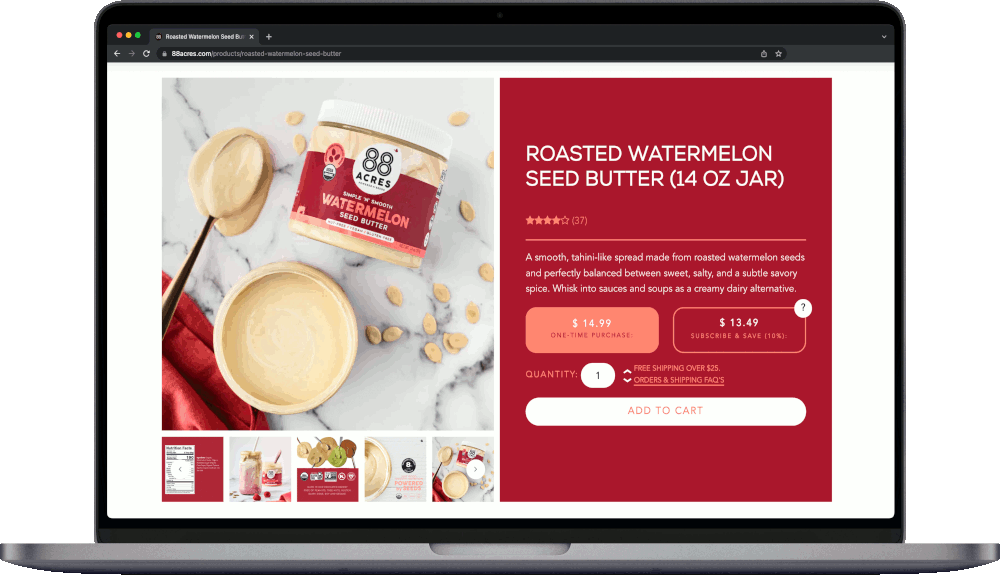Watermelon seeds probably aren’t the first thought that pops into your head when considering the kinds of nut and seed butter available on the market. Nevertheless, it’s a thing, and in this article we’ll be going over some of the benefits of watermelon seed butter you’ll enjoy if you decide to give it a try.
In short, there are several benefits of watermelon seed butter. For one, it serves as an alternative for those with nut allergies. Additionally, it contains more protein than every other type of nut butter, clocking in at 8 grams per 2-tablespoon serving.
These days there’s no shortage of nut and seed butter varieties to choose from. From peanut to macadamia to even apple butter, you’re sure to find a spread that suits your dietary preference.
Watermelon Seed Butter
Watermelon seed butter is a type of buttery spread made from the roasted, shelled seeds of a watermelon.
In doing research for this article, we were only able to identify a small handful of brands that sell watermelon seed butter. The most-reviewed product on Amazon.com is from “88 Acres“.
According to 88 Acres, watermelon seed butter is described as having a mild and earthy flavor, as well as a consistency that is similar to tahini.
Much to our surprise, it has a very light, sand-like color. This is likely because it’s made using the shelled seeds, which are white and not black.
Nutrition Facts
Now that we know what watermelon seed butter is, let’s have a look under the hood to see what the nutritional benefits are.
The table below depicts the nutrition facts for a 2-tablespoon serving of the 88 Acres brand of watermelon seed butter:
| Item | Watermelon Seed Butter |
| Serving Size | 2 Tbsp (33g) |
| Calories | 190 |
| Total Carbohydrates | 6g |
| Fiber | 1g |
| Total Sugar | 3g |
| Added Sugar | 2g |
| Total Fat | 16g |
| Saturated Fat | 3g |
| Cholesterol | 0mg |
| Protein | 8g |
| Vitamin D | 0% DV |
| Calcium | 2% DV |
| Iron | 10% DV |
| Potassium | 180mg |
Not surprisingly, watermelon seed butter appears quite similar to other nut and seed butter varieties as far as nutrition goes:
- Most of its calories are derived from fat
- It’s packed with protein
- Low in carbohydrates
- Contains fiber
Benefits Of Watermelon Seed Butter
Let’s have a look at some of the benefits to be enjoyed when reaching for that jar of watermelon seed butter.
1. It Contains Healthy Fats
One benefit you’ll enjoy when opting for watermelon seed butter is all of the healthy fats it contains.
Watermelon seed butter contains 16g of fat per serving, only 3g of which are saturated. This means it contains lots of unsaturated fats, or the good kind, according to Mayo Clinic.
2. It Contains More Protein Than Any Other Nut Butter
Of all the benefits of watermelon seed butter, its greatest feat might just be that it contains more protein than any other nut butter.
In a previous article where we compared the nut butter with the most protein, peanut butter came out on top, clocking in at 4 grams of protein per 1-tablespoons serving.
Watermelon seed butter contains 8 grams of protein per 2-tablespoons serving– just as much as peanut butter!
Protein is important because the body uses it to build and repair muscle tissue, among other things. It can also help you lose weight by boosting your metabolism, according to Healthline.
3. A Decent Source Of Iron, Too
Another benefit of watermelon seed butter is that it contains iron.
Iron is an important mineral that the body needs to function properly. It helps carry oxygen from the lungs to the rest of the body, according to the National Institutes of Health (NIH).
A lack of iron can lead to anemia, which is a condition where your body doesn’t have enough red blood cells to carry oxygen throughout, says the NIH.
Just a 2-tablespoon serving of watermelon seed butter will provide you with 10% of the daily value.
4. Contains No Artificial Ingredients
Those who prefer to consume all-natural or minimally-processed diets will be happy to hear that the list of ingredients in watermelon seed butter is minimal and unintimidating.
According to the 88 Acres website, the ingredients list consists of:
- Watermelon seeds
- Powdered sugar
- Cane Sugar
- Tapioca Starch
- Sunflower oil
- Sea salt
Furthermore, these ingredients are all organic too.
5. An Alternative For Those With Nut Allergies
Possibly the marquee selling point for many would be the fact that watermelon seed butter does not contain nuts.
This is especially important for those with nut allergies who may not be able to enjoy peanut, almond, or any other kind of nut butter.
Not only is it nut-free, but it contains none of the top 8 food allergens either.
6. Contains Trace Amounts Of Minerals & Electrolytes
Finally, watermelon seed butter contains trace amounts of essential minerals and electrolytes, two of which are:
- Calcium: a mineral that plays a role in bone health
- Potassium: an essential mineral and electrolyte that plays a role in muscle contraction and fluid balance
Although watermelon seed butter contains these nutrients, it only has a small amount. That said, it’ll have you well on your way to reaching your daily goals when combined with a healthy diet.
The Bottom Line
To find out some more of the benefits of watermelon seed butter, we recommend grabbing a jar and digging in to find out yourself.
Watermelon seed butter can be used in many of the ways nut-based butter is used. Spread it on some toast, dips some apples in it, or even drizzle some over a baked dessert. Even if you don’t like it, you’ll still get to reap the benefits.


